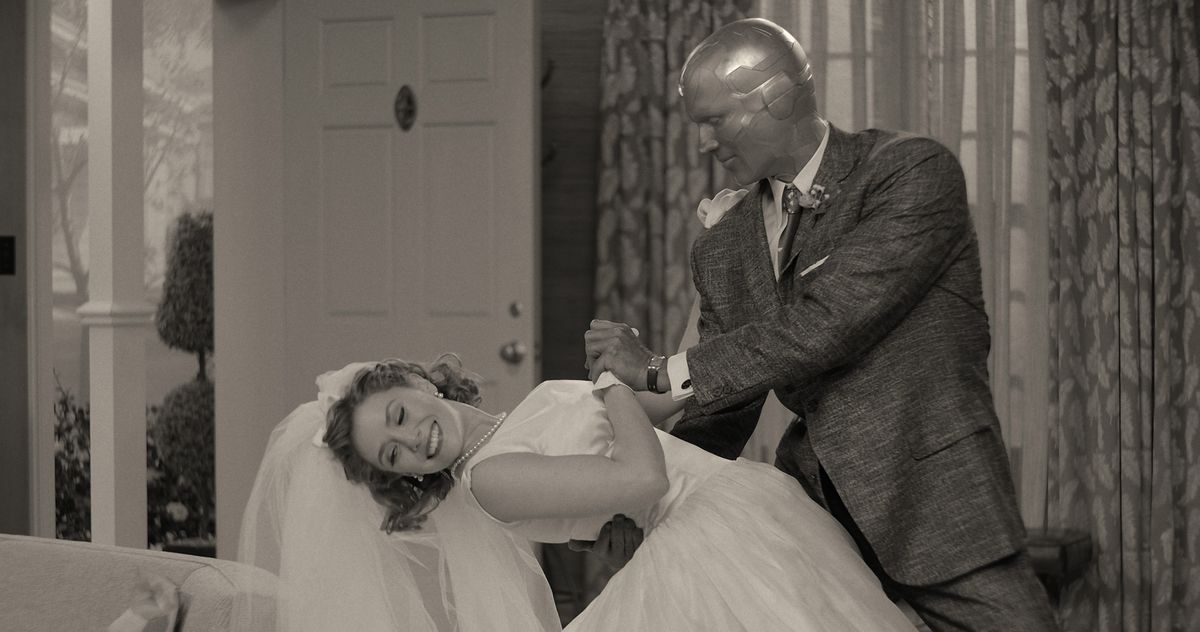 By Jacob Sahms
By Jacob Sahms
Where do we start with Wandavision?
Let’s begin with the basics: the new Disney+ shares the story of the android Vision (Paul Bettany) and the human Wanda Maximoff the Scarlet Witch (Elizabeth Olsen) as they arrive in the old school community of Westview as a newly-married couple. Initially shown in black and white, the romanticized sitcom feel of the show emulates I Love Lucy, I Dream of Jeannie, and Bewitched. Underneath the veneer of normalcy, a sense of sinister danger lurks below the surface, a reminder that things are not as they seem.
The show is laugh out-loud funny, with nods to the shows of the past, as the newlyweds must struggle through new marriage issues, new job issues, and new neighborhood issues. Anyone who has shown up in a new situation and realized that they don’t “speak the language” can relate to some of the hijinks, even if they’ve never been an android or a witch… The dialogue adds to that, thanks to the work of the writers that Marvel guru Kevin Feige has gathered together to shape the show, delivered to us by the admirable efforts of Bettany, Olsen, and others like Katherine Hahn.
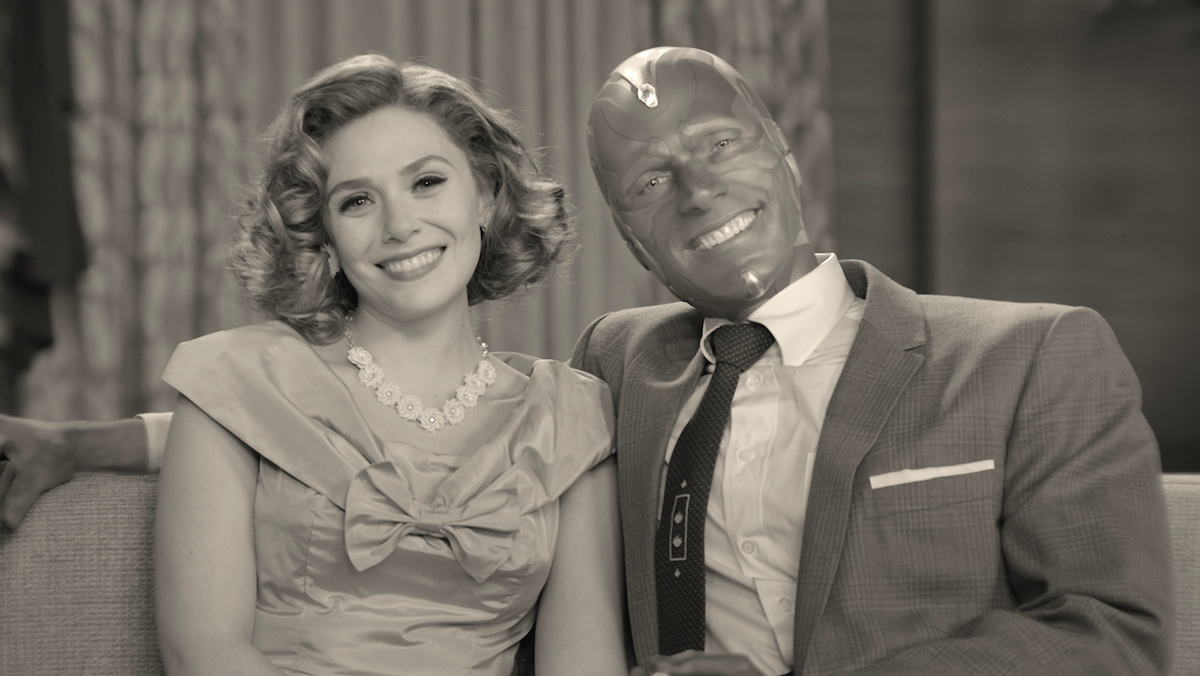 The couple have several choices to make that rise above their specific situation. In a world of Stepford Wives, and corporate clones, Maximoff and Vision are fakes, but they might be the most real ‘people’ in their community. The others, from Vision’s boss and his wife (Fred Melamed, Debra Jo Rupp), to Vision’s co-worker (Asif Ali), to the mean girls in the neighborhood social circle, don’t ask the questions that matter the way that Maximoff starts to, like Truman stuck in The Truman Show initially, watched from the outside without knowing it. In fact, the black and white to color transition here echoes Pleasantville, an awakening not based on society or sexual awareness but of one’s self and purpose.
The couple have several choices to make that rise above their specific situation. In a world of Stepford Wives, and corporate clones, Maximoff and Vision are fakes, but they might be the most real ‘people’ in their community. The others, from Vision’s boss and his wife (Fred Melamed, Debra Jo Rupp), to Vision’s co-worker (Asif Ali), to the mean girls in the neighborhood social circle, don’t ask the questions that matter the way that Maximoff starts to, like Truman stuck in The Truman Show initially, watched from the outside without knowing it. In fact, the black and white to color transition here echoes Pleasantville, an awakening not based on society or sexual awareness but of one’s self and purpose.
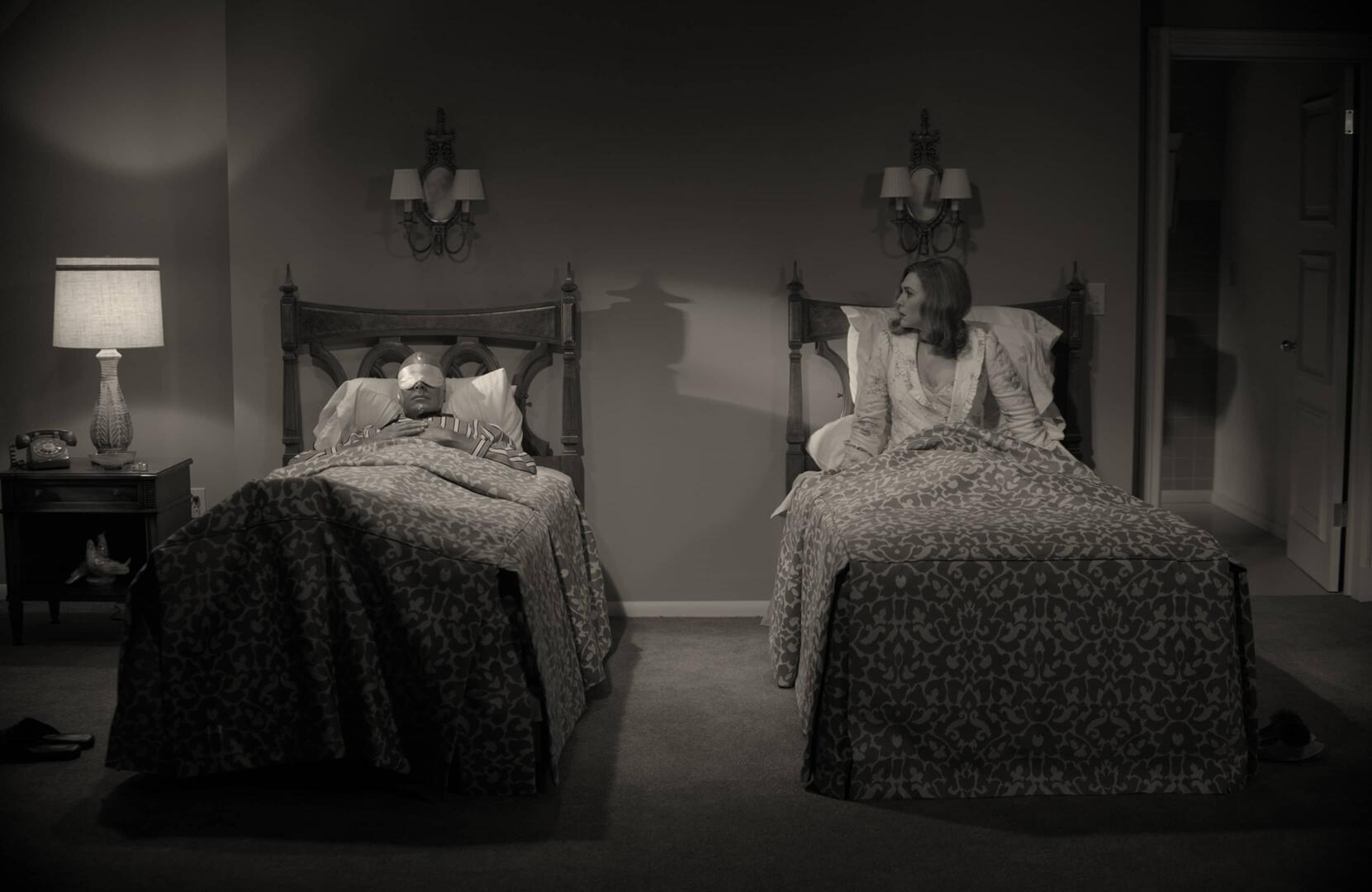
Wandavision is nine sitcom-length episodes but don’t be fooled: there’s plenty going on here.
Fans of the printed Marvel world will know that in 1981, a storyline put the couple together romantically, and that Maximoff was supernaturally impregnated. In 2005, Brian Michael Bendis steered the entire Marvel universe through a reality-warping storyline where she suffers emotional and mental hardship, and uses the spectrum of her powers to recreate a world where she has brought her children back from the dead in House of M. A decade later, Tom King wrote a limited series that allowed Vision to explore what it meant to seek a normal life in the human world with a family of his own. The strands are brought together in ways that Marvel-ites can see the notes, even if the musical piece has been put together in different ways, because this is not an adaptation of any one work but a tribute to many of them.
Spoilers Below
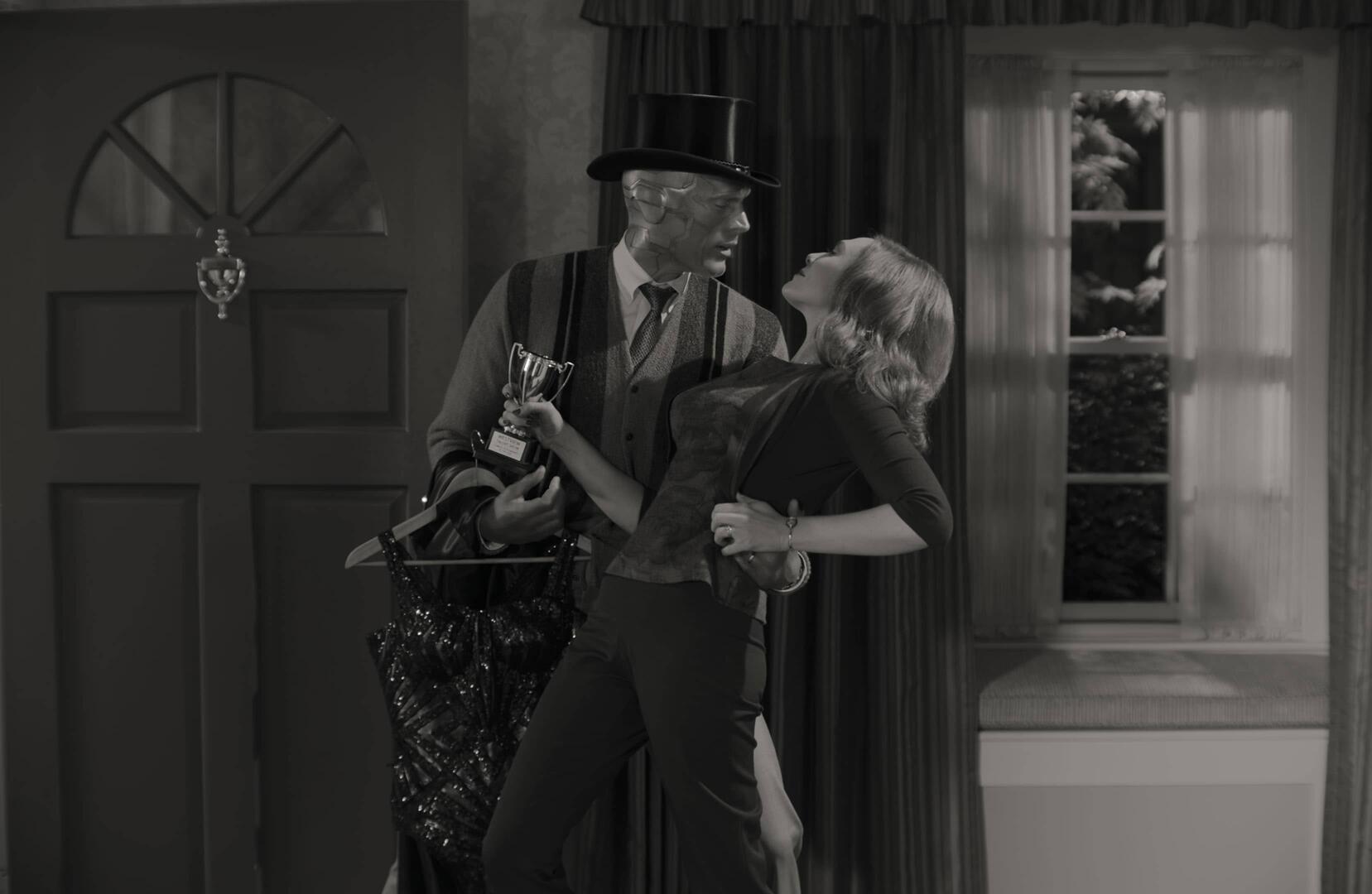
Whether it’s the commercials that point to moments in Marvel history like Strucker timepieces (Baron Von Strucker, HYDRA scientist/villain) or to Stark Industries’ toaster, there are little Easter eggs for those Marvel-ites in the audience. But the biggest question is around the timeline for Wandavision, because we know that Vision is dead (thanks to Maximoff or Thanos depending on the moment). Is he really dead here and she has recreated a fake timeline of their togetherness out of her grief? Or does the voice on the radio warn that Maximoff’s powers are not actually in her control, even if they appear to be semi-omnipotent in the episodes we’ve seen so far? The rules here are up in the air, given her ability to use the powers to rewind time (to avoid a … beekeeper?) but inability to use them to whip up a dinner for Vision’s boss without help from her nosy neighbor (Hahn). That is what’s beautiful about Wandavision: we can enjoy the ride while still having no idea what the ground rules are (see: The Sixth Sense, Lost, etc.)
The ride itself is more in Wanda’s mind, depicted for us by Olsen’s minimalist facial expressions, concern as she realizes that she doesn’t know the answers to questions she should know, grasping at ideas just outside of her memory. How aware is everyone else? When a character struggles physically, almost dying, the character’s spouse gets stuck in a time loop begging Maximoff to help, over and over again. When a mean girl cuts herself, she suddenly becomes aware of Maximoff, and wants to know who she is. When the mailman arrives, he seems genuinely frightened in a world where nothing bad seems to happen.
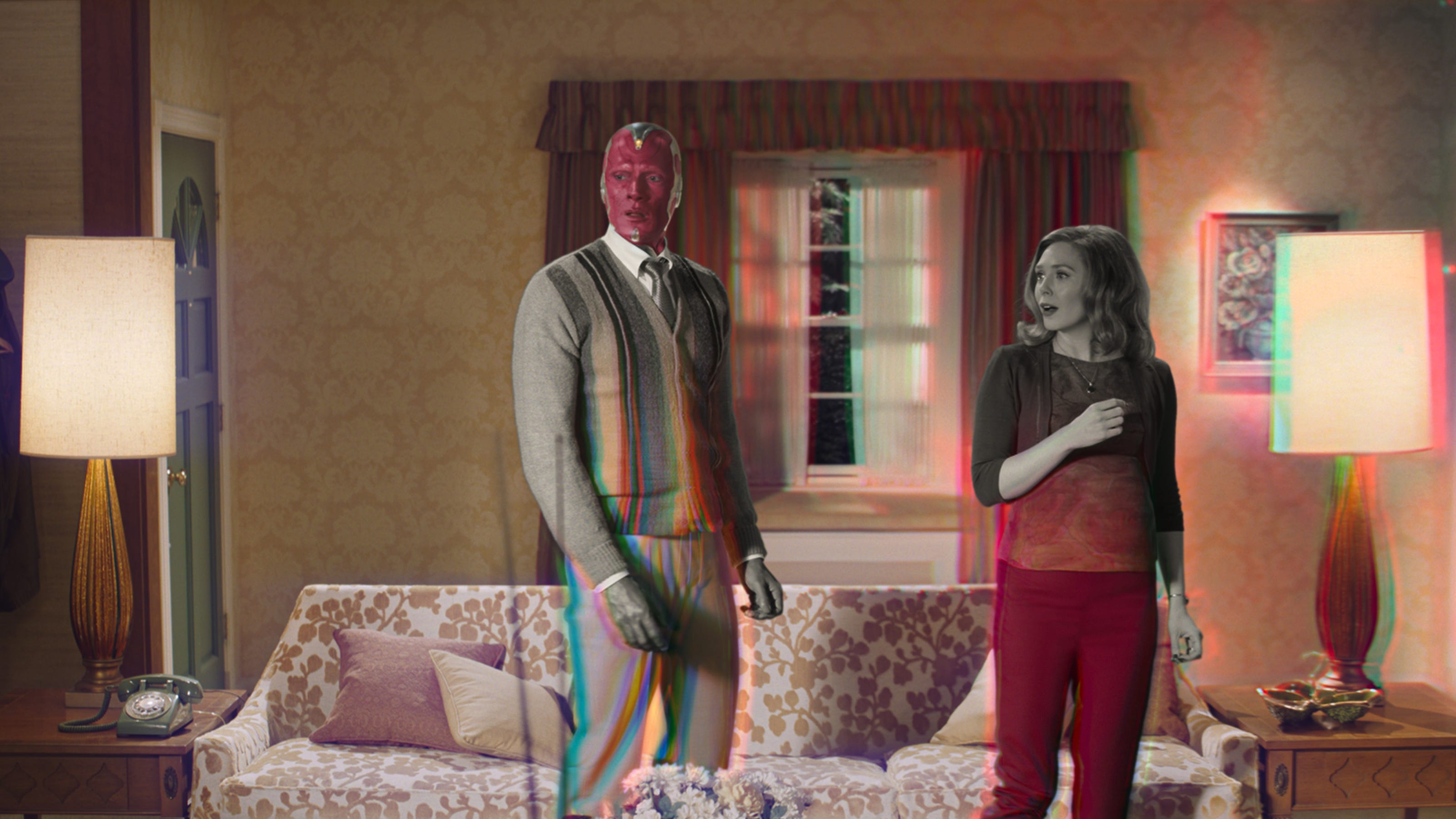 Everything is on the table. In Westview anything is possible. And that’s a beautiful thing. We want entertainment to surprise us and move us like Wandavision does. But in a way that bears noting (and considering over the next seven episodes), too many people feel like they’re living a predetermined life outside of their control, whether it’s because they feel rudderless or they adopt a singular notion that God only has one plan for their life — and that everything has already been decided. This mindset takes away their exploration of free will, and puts causation entirely at God’s feet. Rather than faithfully loving themselves, God, and their neighbor with all their heart, soul, mind, and strength, they float by without really asking the hardest questions.
Everything is on the table. In Westview anything is possible. And that’s a beautiful thing. We want entertainment to surprise us and move us like Wandavision does. But in a way that bears noting (and considering over the next seven episodes), too many people feel like they’re living a predetermined life outside of their control, whether it’s because they feel rudderless or they adopt a singular notion that God only has one plan for their life — and that everything has already been decided. This mindset takes away their exploration of free will, and puts causation entirely at God’s feet. Rather than faithfully loving themselves, God, and their neighbor with all their heart, soul, mind, and strength, they float by without really asking the hardest questions.
Thankfully, Maximoff and, to a degree ,Vision are willing to ask hard questions, to challenge the status quo. It’s not always a smooth upward journey, but they seem capable of figuring out who is calling the shots (whether it’s Maximoff or some external force controlling the strings remains to be seen). Through the story of an android and a witch, Marvel’s Wandavision is challenging us to consider what it means to be truly human.




